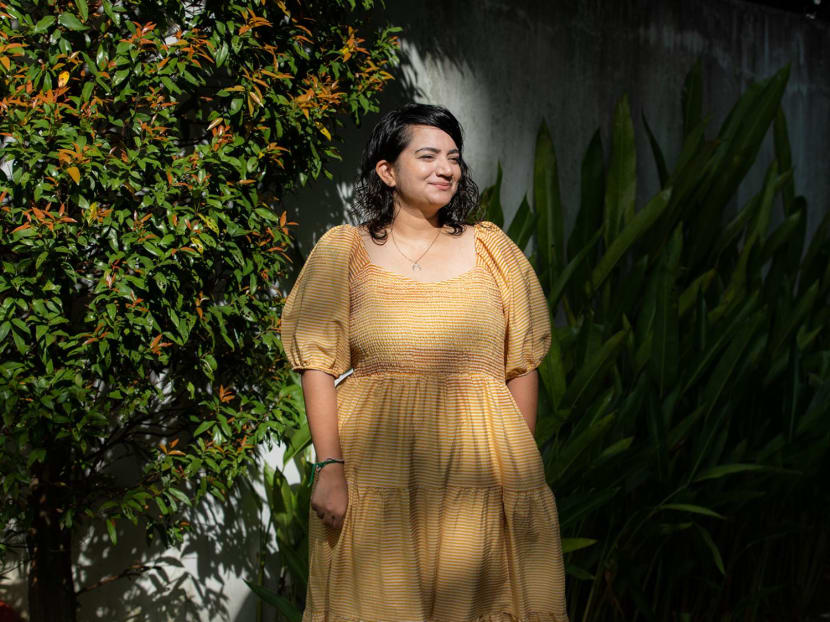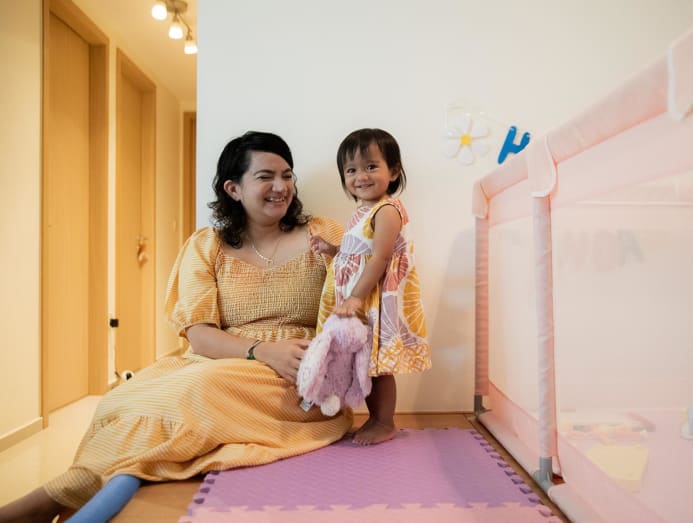Community Heroes: How I help South Asian women in Singapore break the silence around cultural taboos

The writer is the founder of Don’t Say OK, Kanmani, a ground-up initiative dedicated to South Asian women.
I'm a mum to an adorable one-year-old girl, an educator specialising in community engagement skills, and the founder of a ground-up initiative dedicated to South Asian women in Singapore.
My journey with Don't Say OK, Kanmani is deeply influenced by my late mother. She passed down not only knowledge and wisdom, but also cultural norms and rules set aside for South Asian women. For instance, “no entering a temple when you’re menstruating”.
These were passed down by her mother, and her mother before that, and they were taught not to question these rules.
Inspired by my mother’s struggles, I was determined to shatter this silence.
Don't Say OK, Kanmani began in 2020 as a platform for South Asian women to share stories, seek support, and collectively challenge societal norms.
The name Don’t Say OK, Kanmani (defined as precious one in Tamil) is a gentle nudge to many women, especially from minority communities, who perhaps tend to say “OK” too easily, accepting whatever is given without asserting themselves.
For the past four years, we have highlighted the stories of countless women, each sharing her unique lived experiences. We do this by hosting fireside chats and panel discussions on a range of topics affecting women.
These include menstrual health, cultural taboos, and female leadership. We delve into these subjects to understand their profound impact on our daily lives.
Being a South Asian woman myself, I recognise that we have internalised certain societal expectations. Dismantling them remains a gradual process, with women and girls encountering unique obstacles, especially in patriarchal societies.

For instance, it is challenging to address sensitive topics such as marital expectations, which can often evoke resistance or discomfort due to entrenched cultural norms.
I empathised deeply with the barriers these women faced. They were not completely unfamiliar to me, as growing up, I too witnessed this in my own home.
I've noticed that although girls and women eagerly sign up with us, they frequently hesitate to voice their opinions. Overcoming these barriers required not only sensitivity, patience, and a commitment to creating a non-judgmental space, but also a profound understanding of the emotional weight these topics carry.
One approach we employ involves sharing our own stories and experiences — the emotions and struggles we've endured. By being vulnerable and transparent about our own journeys, we aim to create a sense of understanding within the community and harness the powerful tool of storytelling.
I also recognise that participants prefer online sessions when it comes to some topics, giving the option to remain anonymous.
We usually hold monthly small-scale sessions of up to 60 participants as these are more manageable for our team to handle.
Each month has a different theme. For instance, in February we met with younger girls to talk about the importance of female friendships and finding support.
In March, we hosted female business owners to discuss how we could further support one another.
The success of Don’t Say OK, Kanmani isn't measured solely by participant numbers or events we’ve had. Rather, it lies in the resonance it generates within the community.
For instance, my core team, including Asha Suresh and Nandhini Balakrishnan, whom I had never met before the initiative, joined after discovering our Instagram page, which currently has about 1,900 followers.
Many other women have similarly connected with our work and collaborated with us on various projects. Now, the thought of navigating this journey alone feels unimaginable.
Another source of joy was our fireside chat last December on female leadership and its societal role.
Women expressed a longing for spaces like ours, fostering meaningful dialogue and community engagement. Their positive response affirmed the importance of valuing these leadership approaches and facilitating such crucial conversations.
My mother died in 2022, but her response to Don't Say OK, Kanmani remains a profound source of inspiration for me.
Before her passing, she conveyed immense pride in the initiative and its influence on the community. On numerous occasions, she expressed her desire to contribute in any way possible, even wanting to involve her friends.
In fact, our recent initiative called Tech Mama, aimed at bridging the digital gap between different generations, is a tribute to her — inspired by her willingness to learn new things — and included some of her acquaintances.
My tip to anyone wanting to start a ground-up community is to always keep the community at the centre of everything you do and bring them along on the journey! In the words of an African proverb, “If you want to go fast, go alone. If you want to go far, go together.”
ABOUT THE WRITER:
L Priyeswari Devi, 33, is a lecturer teaching Creative Community Engagement with Psychology at Singapore Polytechnic, and the founder of Don’t Say OK, Kanmani, a ground-up initiative dedicated to South Asian women.
Don’t Say Ok, Kanmani is supported by Bagus Together, an initiative which helps changemakers and ground-ups start and sustain their work.
If you have an experience to share or know someone who wishes to contribute to this series, write to voices [at] mediacorp.com.sg (voices[at]mediacorp[dot]com[dot]sg) with your full name, address and phone number.






